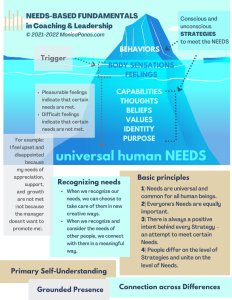Needs-Based Fundamentals in Coaching and Leadership
by Monica Panas, ICF PCC and CNVC Certified Trainer, Coach and Facilitator
Origins
Needs-based approach was developed by Marshall Rosenberg (PhD in clinical psychology under Carl Rogers). He studied various psychological approaches and wisdom traditions to find out what determines connection and disconnection between human beings. He focused on the aspects of needs-based communication and named it Nonviolent Communication (NVC). It’s a powerful tool to facilitate group and team dynamics, dialog across differences, effective collaboration, and conflict resolution which are all essential skills of advanced leadership effectiveness.
Evolution
The fundamentals of needs-based approach are equally powerful when applied to self-development, and thus coaching and leadership. It becomes even more relevant when we consider that the current neuroscience can explain its transformational function. Rosenberg’s basic approach gained followers and evolved in various directions and thus today the term “needs-based” is understood and used in many ways. I have also built on it and developed it through ten years of coaching practice and teaching coaches and leaders how to apply it for building resilience, impactful presence, and practical compassion that transforms relationships and systems we are a part of.
Basic principles
Here I share the basic principles that are fundamental to this approach.
1) Needs are the driving force behind all our conscious and unconscious behaviors and mental models (incl. beliefs and values). Needs are universal and common for all human beings. Everyone’s needs are equally important.
2) Our behaviors and mental models are Strategies to meet our needs. There is always a positive intent behind every strategy – an attempt to meet certain needs. There is an infinite number of strategies to meet a given need.
3) People differ on the level of strategies and unite on the level of needs.
4) Needs are dynamic – they can change from one moment to another. Feelings indicate if our needs are met or not met. If we experience pleasurable feelings, it means that our certain needs are met. If we experience difficult feelings, it means that our certain needs are not met.
Benefits
Recognizing and naming needs creates a deeper level of self-understanding and mindful presence. It reveals our deepest, usually unconscious, motivation and facilitates resolving inner conflicts. It quickly helps bring the nervous system back to balance from reactivity to responsiveness. Then we can choose to take care of our needs in new creative ways. It is a very practical self-compassion practice that builds resilience and grounded impactful presence in challenging circumstances. We can practice it not only on an individual level but also on an interpersonal, group, and systemic level which expands our understanding of the reality. It accommodates new solutions that consider needs on different levels and from different perspectives. It’s a relevant capability for leaders facing complexity and uncertainty of the reality and all possible change.
